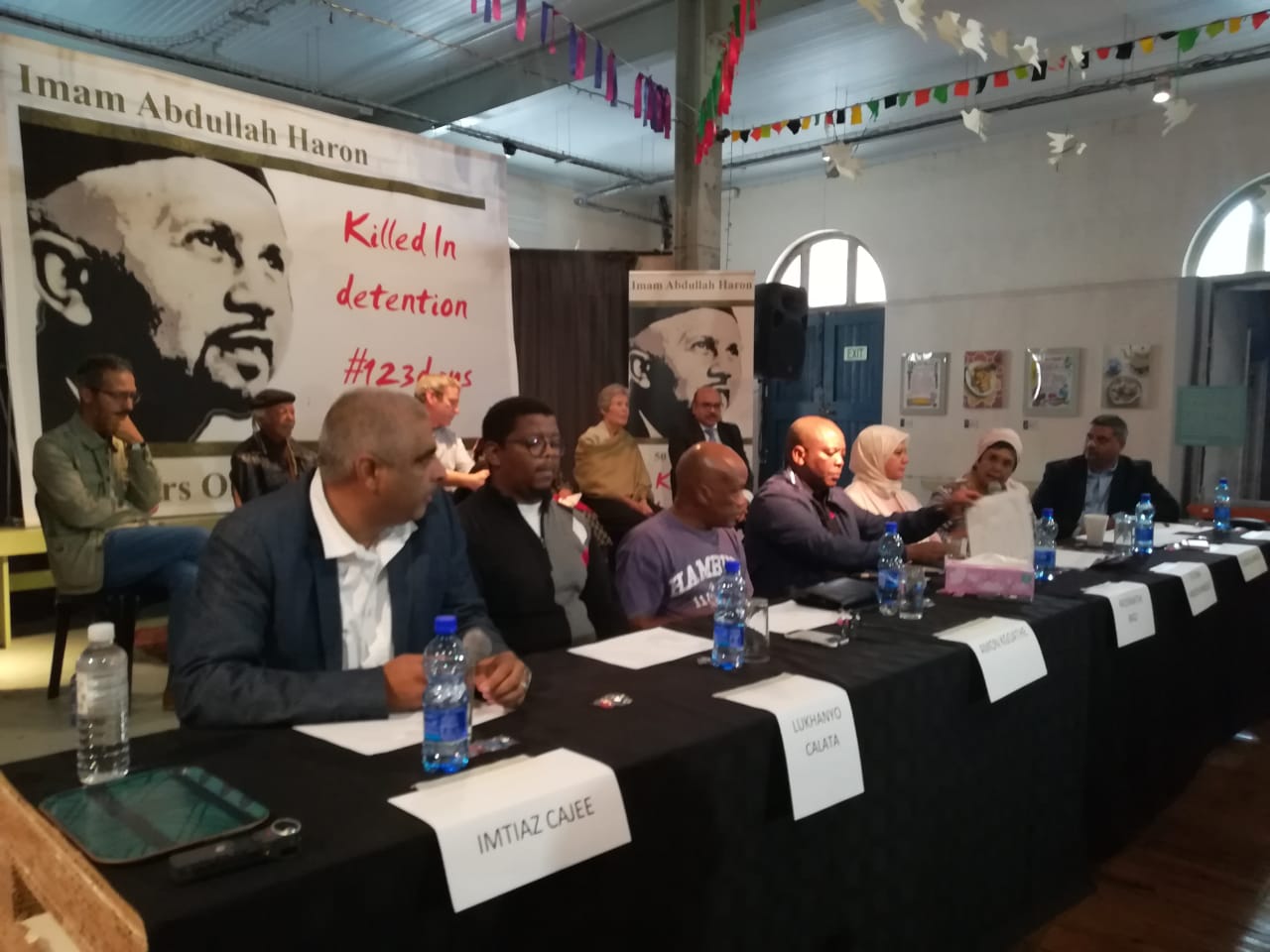By Tasneem Adams
The family of the late Imam Abdullah Haron will reopen the inquest into their father’s death in 1969. The long-awaited decision follows the success of the Ahmed Timol inquest, in which reopened by the National Prosecuting Authority (NPA) in 1996. Imam Haron died on September 27, 1969, after being held incommunicado for 123 days by the South African state security in an apartheid prison. At a press conference on Friday held at the District Six Homecoming Centre, the family also announced the launch of a 123 day commemoration to mark 50 years since his death. The launch today also coincides with Imam Haron’s birthday.
“As a family, we have agreed to follow the path of the Timol family and have the inquest reopened. So that we firmly prove that our father’s death was not due to an accidental fall over a bar of soap or a flight of stairs,” said imam’s daughter Fatima Haron-Masoet.
During an inquest into his death, police argued that the injuries he sustained were from falling down a flight of stairs at the Maitland police station. The extent of the Imam’s torture was revealed in an autopsy report which found he had severe bruises on his body, mostly on the legs. The imam had also suffered He had a haematoma internal bleeding near the base of the spine. It was discovered that his stomach had been empty and his seventh rib was broken.
“Each of one of us have suffered and have been left traumatised by our father’s death,” said Haron-Masoet.
Imam Haron died in the same year that six other struggle heroes were killed in detention, namely Nicodemus Kgoathe, Solomon Modipane, James Lenkoe, Caleb Mayekiso, Michael Shivute and Jacob Monakgotla.
The Haron family believes the Truth and Reconciliation Commission (TRC) was flawed and failed to provide justice to those whose loved were killed by apartheid police. Many observers have argued that the TRC did not adequately address the collective loss of dignity and the systemic violence suffered by those oppressed in the apartheid regime.
At the time of the TRC in the early 90’s, Gadija Haron felt the commission would not bring true justice to the afflicted families. The Haron family decided not to attend the hearings. Two decades later, the family now believes its time the family seeks answers on the circumstances around their father’s death and have been implored by their 93-year-old mother to seek legal recourse.
“My mother has informed us that if we need closure on how our father died, we should reopen the inquest. She says although she is one foot in the grave, she believes closure will be brought for us as his children. We suffered so much psychological trauma each individually.”
The family have the support of the Pretoria based Foundation of Human Rights under Advocate Yasmin Sooka’s directorship. Haron-Masoet hopes this decision will inspire other families to tell their story and seek the truth through the justice system.
The press conference also heard the stories of the Steve Biko’s son Nkosinathi Biko, Amon Kgoathe, Lukanyo Calata and Imtiaz Cajee, the nephew of Ahmed Timol. At the press conference, journalist Lukhanyo Calata spoke of the pain and anguish his family had experienced in the wake of his father’s murder in 1985. Fort Calata was an anti-apartheid activist who was part of the Cradock Four, murdered by apartheid agents in 1985. The South African security police abducted all four activists, killed them and burnt their bodies.
Lukhanyo and his family have expressed their full support to the Haron family and will now also prosecute those responsible for his father’s death. Lukhanyo today made an impassioned appeal on the government to bring his father’s murderers to book
“Hear us. Hear the fact that we as the families of people murdered by the apartheid government are looking at you, the ANC and the government, to serve us with justice. Please take this message back to the president. We are asking for justice,” he urged.
Imtiaz Cajee said the Timol family “totally supported” the decision taken by the Haron and Calata family.
“More than 50 years have passed since the death of the imam and one can imagine the pain the family has endured. This is what the Timol family has gone through and its a painful exercise.”
As the family marks 50 years since his tragic demise, they have decided to set up the Imam Abdullah Haron Foundation 50th Commemoration Committee to honour the Imam’s life and martyrdom. The IHF is a registered structure that is managed by a committee under Cassiem Khan, who was appointed by the family, as its national coordinator.
The IHF will host a series of commemorative events to honour the legacy and memory of the Imam and of those who fought in the struggle. The campaign will kick off in May under the hashtag #123 , to mark the 123 days the imam spent in police detention.
Friday’s launch was attended by a number of high profile politicians, clerics, activists and journalists such as ANC ANC deputy secretary general Jessie Duarte, Ebrahim Rasool, Judge Siraj Desai, former minister Ebrahim Ebrahim and poet James Matthews, a friend of the late imam.
Former minister Ebrahim Ebrahim has urged other families to follow the Haron family’s example.
“The Ahmed Timol case set a good precedent and the families who have loved ones who were killed by apartheid police and should make an attempt to reopen their cases and hold those responsible to account. It’s a shame that the government has taken so long to begin to act on these issues. The Haron family have done the right thing,” he said.
VOC






 WhatsApp us
WhatsApp us 

